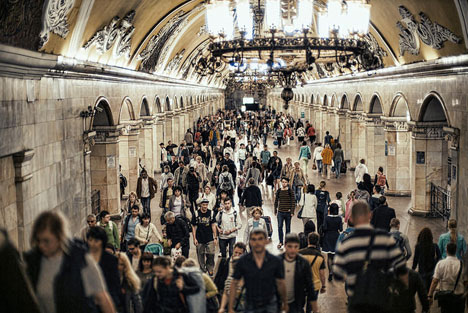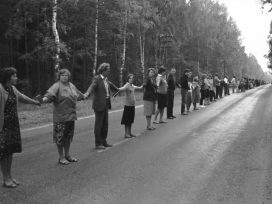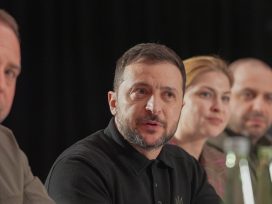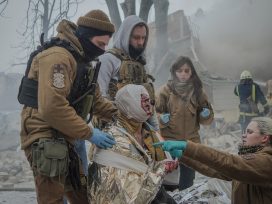At a certain point, every authoritarian state must choose democratization or collapse. But according to Ella Paneyakh, the Russian system is seeking a third way. It has in its sights nothing less than the social fabric: human interrelations, mutual support mechanisms and the capacity for joint action.
The latest results of a survey, “Eurobarometer in Russia”, an opinion poll carried out by Viktor Vakhstein and his team at the Russian Presidential Academy of National Economy and Public Administration (RANEPA) since 2012, have recently been published. The project website states that the research uses the methodology of the Eurobarometer surveys commissioned by the European Commission and implemented in all European Community/EU countries since 1974, and is based on interviews with a representative sample of 6000 persons. Those not familiar with the Russian sociological community may also be interested to note that the project’s leader, Viktor Vakhstein, is one of the most highly regarded experts in his field, known for his meticulous attention to ensuring the uncontaminated nature of the data. Three major polls using the same methodology have been conducted to date, in 2012, 2013 and 2014.

Daily life, Moscow Metro, 30 May 2014. Photo: Christopher Michel. Source: Flickr
Data from the past three years allow us to draw some preliminary conclusions concerning the dynamics of the indicators studied in the course of the project. While many of the results of the Eurobarometer study confirm data from other organizations measuring public opinion and monitoring socio-economic developments (for example, Russian citizens are increasingly aware of economic problems in their own lives, while at the same time being inclined to assess more positively both the economic situation of the country as a whole and the work of the authorities), some new and so far unexplored information has also emerged. The fundamental and most unexpected finding is one that gives cause for optimism, especially as it does not seem to be in line with the generally held view of the way Russian society has evolved in the “post-Crimean” period, nor of its general state in the post-Soviet period. The data show that the number of horizontal interpersonal links within Russian society has grown at an astonishing speed, that is to say, the social fabric of society has become tighter, overcoming the much-touted atomization of the post-perestroika years. In other words, the networking dimension of social capital in Russian society has been increasing.
Over some two years the number of people who can be defined – without resorting to technical sociological definitions – as being close, i.e. on whose support the average Russian can count (“strong links”), has doubled: while in 2012 respondents listed on average four each, in 2014 this figure was eight. Even more significantly, there has been a notable increase in the number of acquaintances (“weak links”): from 25 in 2012, to 35 according to the latest research. Although there is no doubt that these processes did not begin only in 2012, there is no reliable quantitative data for earlier years, as no one thought of conceptualizing and systematically measuring this kind of indicator. However, several qualitative indicators show (I base this not on the findings of my RANEPA colleagues but rather on my own observations as well as on what the political scientist Ekaterina Shulman has said about the same Eurobarometer findings in an article for Vedomosti) that the number and diversity of social links in Russia has been growing for about ten years, and this began to translate into changes in social life at least five years ago. Whereas in the 1990s – as a result of the post-Soviet atomization and disintegration of the old Soviet institutions and a lack of resources to create new ones – the average Russian had virtually no links outside his or her closest family (nuclear family, parents, grown-up children) and immediate workplace, the situation has been changing since the 2000s, as prosperity increased and new technologies began to become part of everyday life. New circles based on virtual communication and professional groups linked by common interests and hobbies emerged and people began to adopt new group identities.
This process was by no means homogenous, occurring, as it were, stratum by stratum: the most “progressive”, educated and articulate individuals, who were able to access social media and other technologies that facilitate contacts were the first to be mobilized; followed by the youngest and most radical people, those who felt the greatest need and were most interested. To many Russians it came as quite a shock to see again long-forgotten radical protest marches, coordinated through V kontakte (the local social network developed by Russian programmers and popular in Russia that enables the sharing of audio and video content, in addition to having a fully Russian-language interface). Facebook then became the focus for charitable, educational and civil society activism for what might be labelled the liberal-minded section of society, driving supporters of a pro-Western course out to Bolotnaya Square in late 2011 and early 2012. Next, those whom we might call conservatives also started hanging out on social media and eventually traditional forces of an Orthodox as well as of pro-Soviet ilk united, launching a trend which the ruling elite has by now managed to dominate to some extent. For all intents and purposes, the mere fact that an individual has virtual acquaintances beyond their standard circle of home-and-work, is active on social media and participates in mutual support groups (since social networks, by definition, play a support role), nowadays no longer marks out that person as being “progressive” or as holding any specific views. These kinds of connections are now the rule rather than the exception, since any semi-literate young layabout or elderly, not particularly technology-savvy person now has access to a page on the Odnoklassniki [classmates – trans.] website, to a mobile phone and Skype, provided they know the alphabet and can hit the right key. There are, of course, some that fall below even this social hurdle but their numbers are negligible and the phenomenon can safely be regarded as universal. The degree of connectivity within Russian society is now radically higher than it was ten or fifteen years ago.
A great deal of sociological literature has been devoted to the usefulness of these links, no matter how weak (for being in touch with someone on V kontakte is surely not necessarily all that significant), but the Eurobarometer study in Russia has demonstrated this very graphically, making an in-depth theoretical explanation redundant. The poll shows that more than 90 per cent of those respondents with the greatest number of links feel happy (“A 10 per cent increase in the median number of social connections results in a 14 per cent increase in the happiness index”, the report informs us in the dry, bureaucratic language of statistics). It also shows that they feel much more secure and confident of their own strength and of what the next day might bring. They believe that even if they are sacked, they won’t stay jobless, that they will be able to repay their debts and raise enough money if disaster strikes. All in all, interpersonal relations are a good thing. There is also a significant correlation between having more social links on the one hand and the growth of political and economic optimism on the other. Strange as it may sound, it is quite likely that this increase is not primarily due to TV propaganda lauding the country’s great achievements. Just imagine what would happen if the same tunes – extolling the return of Crimea – had been played around 1993 or 1996, when social atomization and disillusionment in the new political system were at their height. In those days, this kind of barrage of propaganda would hardly have inspired any optimism in ordinary Russians; it would only have given rise to anger and irritation. Readiness for activism and participation in public activities has grown significantly. As a matter of fact, in spite of Putin’s famed 80-90 per cent popularity rating, the data collected not just by Russian pollsters but also by such an authoritative agency as Pew Research show that the number of those who consider themselves capable of changing the political situation for the better has almost tripled compared with the “revolutionary” year of 2012 and is now in the region of 25 per cent. Social activism. Confidence in the future. Independence. “How will the state react to this, what will be its response to society’s new demands?” – Yekaterina Shulman asks in her article and her answer is as follows: contemporary political science says that when society starts growing up, an authoritarian state has only two options. It can either democratize itself, aligning the practical task of running the state with the new requirements. Or it will collapse.
In fact, we no longer have to guess at how the present-day Russian state will respond to the underlying growing up of Russia’s society and the tightening of its social fabric. It has already responded to the demand: by quite deliberately pushing society into a state of re-atomization. It has done so through a policy of destroying links, sowing strife and discord, causing social disorganization and opposing any self-organization and social activity, including those of a totally apolitical, and even openly loyalist, kind. It has responded by hideous trolling and eavesdropping on social media; by prohibitively increasing the cost of any organized activity, from businesses to amateur dance clubs, as long as they are formally organized, financially accountable and have an official list of members – things that can be pounced upon on formal grounds. It has responded by being suspicious of any unauthorized group activity – anything can be deemed punishable, from collective outdoor dancing, through donating one’s own money to support education and scholarship, to helping the local population to fight fires, let alone projects that relate to politics in any way.
However, it would be wrong to imagine that this tendency is driven exclusively by “the Kremlin”, by the individual or collective Putin, who has realized the danger and come up with a clever plan: to switch attention to the return of Crimea; to concoct 88 per cent ratings; to plunge the economy into a crisis; to empty the nation’s pockets; to brainwash the people and make society just as atomized, confused and poor as it was in the 1990s – pliable, that is, in the hands of an authoritarian ruler. The “regime” does not involve just the will of the ruling clique. The political regime, as we see it, consists of multiple actions by individuals who make up the state, mostly at the lowest level, exemplified by the state prosecutor who, out of concern about public morals, has decided to launch an investigation into some girls who twerked in Volgograd, based on the incontrovertible grounds that the associated video clip happens to include a shot of a monument to the heroes of World War II. Or take the ordinary humble teacher who sits on the local election committee (Russian election committees are usually located in schools and are largely composed of their staff). Yesterday she faked the election results because she “was instructed to do so”, and today she will expose your child to a political lesson on Ukrainian boys who have been crucified, because this is what she believes to be the easiest way of keeping her class under control (it’s one thing arguing with a teacher who commits grammatical errors but just try arguing against the party line!). Or let’s take the two cops. The first, a riot police officer, batters protesters, while the other – an officer at the local police precinct where those detained have been brought – later openly lies in court that he was present during their detention – not out of any great loyalty to the Kremlin but because their military, legal and moral training doesn’t allow them to enforce public order or document offences in a peaceful and civilized manner.
And this aggregation of individuals who, unfortunately, comprise the Russian state are all fully aware – each at their own level and in their professional role – of the danger, discomfort and moral implications they are facing because the people in this country are slowly but surely ceasing to be intimidated loners. They are aware that people are grasping opportunities and skills enabling them to defend one another, as well as against the state – for instance, against that same teacher who might terrify your child with the story of a crucified boy, and amuse you with a forged ballot paper – to increase their independence of those very state institutions; to offer mutual support; publicize problems, self-organize and unite. And never mind that, unlike higher-ranking state officials, this same teacher, in her private life, is a member of society just like us, who has her own page in V kontakte; wishes us all the best and faces the same problems in her relations with the state as we do. Like us, she is unable to get an appointment with a specialist doctor, is scared of everyone in a uniform, and her only support network in an emergency are her friends and nearest and dearest. In her professional capacity, however, she is alarmed by these links among people – including the simple fact that a child might be able to ring his or her parents at any time (hence the eternal fights about mobile phones in the classroom) – and she is fighting them. As best she can. And our prosecutor gets very upset when, for example, the minutes of an inspection of some “unreliable” organization – a completely open document he has handed to the organization’s representative – end up on the Internet. And the highest authorities are happy to provide lavish funding for the salaries of the infamous internet trolls who generate so much noise on the Internet that communication becomes impossible not only among Russians but also on media forums with a worldwide audience.
Not all processes aimed at deliberately devaluing social capital are as obvious as the ones mentioned above. For example, one upshot of the “fight against corruption” in medicine is that now even those who have connections sometimes are unable to get the medical help they need, already unavailable through official channels. Of course, in absolute terms it is primarily the poorest and loneliest who are hardest hit by the reform, people who simply have no chance of making their way through the thicket of bureaucratic procedures (such as the recently introduced priority online registration, which discriminates against the poorest and less educated people). Or those who have simply been deprived of any help because the consolidation of medical facilities has reduced the chances of access to those on the lowest rung of the social ladder. The Eurobarometer findings show that only one third of Russians intend to see a doctor if they fall ill, the rest preferring various forms of self-treatment. There is a noticeable correlation between the decreasing willingness of people to use medical services and their distrust of state institutions. However, the impact is also felt by those who used to be able to access services by using their connections and circumventing the bureaucratic system, i.e. the most resourceful people with the most extensive links. To achieve this remarkable result the regime has not, apparently, spared any means, including jeopardizing the lives of the poorest.
The official information policy, constantly fabricating enemies on TV, fomenting anxiety in the information field and inciting fear and aggression has, naturally, left its mark in the form of a secondary atomization of society. However, the new propaganda campaign is not the cause but rather one of the most visible manifestations of a deeper process. To rephrase Pushkin, who declared some two hundred years ago that “in Russia the government is the last European” (a rather dubious conclusion even in his day and age, when the country’s entire elite communicated in French), today we might say that after many years of social evolution and state degradation, the Russian state is the last non-European, lagging behind its population in every respect. Being challenged by a maturing society this state is now mobilizing itself, overcoming its own internal fragmentation and seeking strategies to reverse the process of grassroots mobilization in order to regain the advantages of being the only organized force in a disorganized social field. The problem is that the social fabric is a delicate, albeit also a rather flexible, structure based on trust, predictability and a certain transparency in interpersonal relations. Faced with the choice between the two options of “collapsing or democratizing” outlined by the political scientists, the system is feverishly seeking a third way: how to destroy us. Not “us” in the sense of the opposition, the “creative class”, or a particular, conscious part of society, but rather us, that is, society as such: the social fabric, human interrelations, mutual support mechanisms, the capacity for joint action. The Eurobarometer findings in Russia show that it has not yet fully succeeded in achieving this. However, there are many signs that we are already in the early stages of this process.
This article is a revised version of an op-ed piece entitled “Social disorganization” which appeared in Russian in the newspaper Vedomosti, no. 3855 (19 June 2015).
Published 30 July 2015
Original in Russian
Translated by
Julia Sherwood
First published by Eurozine
Contributed by Transit © Ella Paneyakh / IWM / Eurozine
PDF/PRINTPublished in
In collaboration with
In focal points
Newsletter
Subscribe to know what’s worth thinking about.
Related Articles

The fall of the Berlin Wall, and not the human chain across the Baltics, is emblematic of 1989. But what if this show of unity had become iconic of communism’s disintegration? Could acknowledging Eastern Europe’s liberation positively reframe what Russia otherwise perceives as loss since the Soviet Union’s demise?

The ‘Trump–Putin deal’ again places Ukrainians in a subaltern role. The leaked contract with its fantasy $500 billion ‘payback’ has been compared to Versailles, but the US betrayal recalls nothing so much as Molotov–Ribbentrop.






